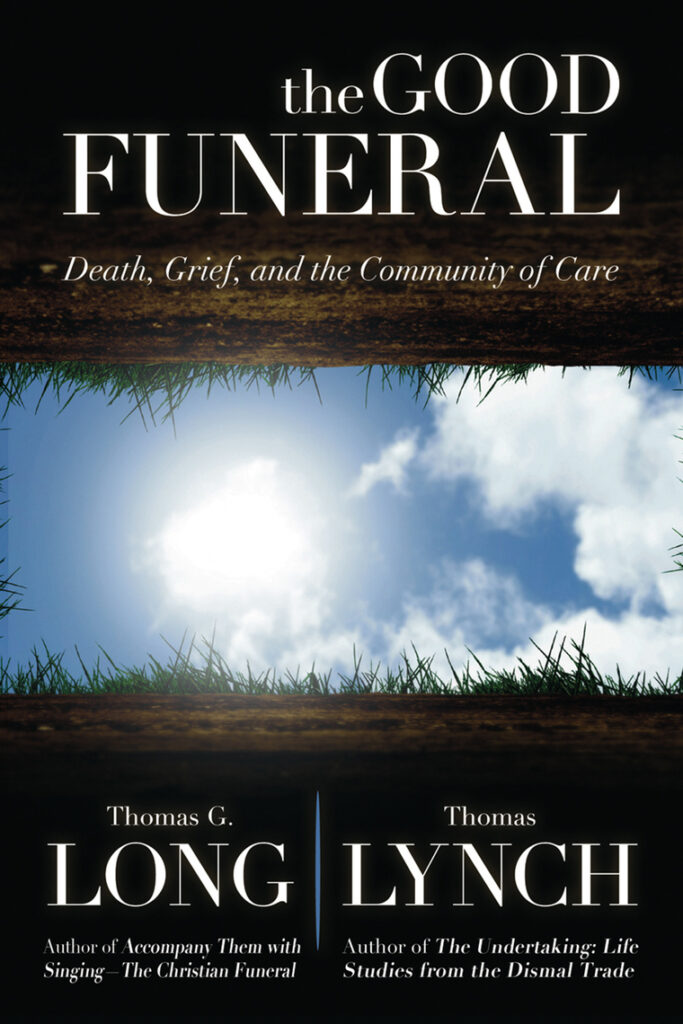
A decade ago, I read Thomas Long and Thomas Lynch’s The Good Funeral: Death, Grief, and the Community of Care. I’d taken a of study leave to read and was staying at my grandma’s house outside of Pinehurst. While there, I did what I have always done when here in Moore County, attend church at Culdee. Afterwards, my daughter and I spent some time walking around the cemetery. Some of the tombstones brought back memories. At this time, I could count at being on being there for at least seven funerals.
Since then, I can add two more, a grandmother and an aunt (of which I officiated as the church was without a pastor at the time). There are also those whom I never knew who are buried there, such as my great-great grandparents and an aunt that died from leukemia when she was three. The cemetery held other memories. As a young teenager, I recalled helping my grandmother clean up the cemetery.
My first memory of the cemetery was from when I was eight years old. We left Moore County when I was six and was living in Petersburg, Virginia at the time. When the call of death came, we headed home… When I die, having lived all over this nation, I have often imagined my cremains coming home to rest on this sandy ridge between the Little River and Nick’s Creek, while awaiting the resurrection.
Memories of my first funeral home visit
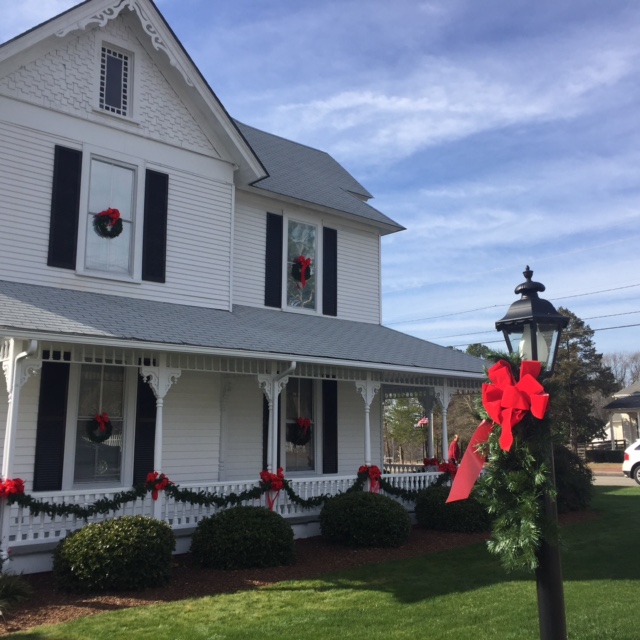
My brother, sister and I stood in front of the casket holding the body of my great-grandma, Callie McKenzie. Behind us stood our mom, hovering over like an angel as she wrapped the three of us in her arms. We gazed at the body which everyone said looked so much like her. It didn’t. Bodies never look life-like, and great-grandma’s body was no different. Mom pointed to her hands. Wrinkled, they were covered with brown liver spots. Mom reminded us of all the strawberries she’d picked, the tomatoes she’d raised, the apples she’d peeled, and the corn she’d shucked.
When I was younger, we lived next door and sometimes on Sunday afternoon, after church, we’d gather with our extended family in her backyard, under the pecan trees. The boundaries of her lawn were marked by the back porch, a dirt road over beyond the well, a corncrib in the back, and a smokehouse and woodpile on the far side, just in front of the canebrake. Tables were set out and we’d have lunch, followed by a slice of pie that she’d baked Saturday evening in her wood burning range. She had a gas range but preferred the wood burning one. “We’ll never taste another of those pies,” Mom sadly reminded us.
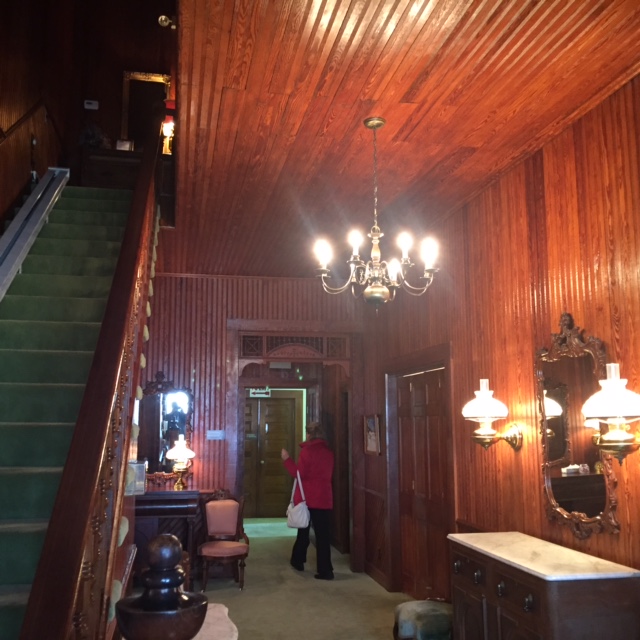
After a few minutes, Mom shuffled us out on the porch of the funeral home in Carthage, into the warm humid air of a July evening, telling us to behave as she went back in with the adults. Much later, we drove to my Dad’s parent’s home, where we stayed the night.
My grandmother was gone at the time of her mother’s death
It was unnervingly quiet at my grandparent’s home on Juniper Lake Road. No one was home. There were no ice cream and Pepsi floats before bed, as was my granddaddy’s habit. My grandparents and my uncle, Larry, who was just a teenager, were in Florida on vacation and unaware of our presence at their house. Nor did my grandmother know her mother had died.
In this day before cell phones and computers, it was nearly impossible to find someone on short notice. My dad called the highway patrols in Florida and the states in between with a description of their car, in the hopes they could get a message to my grandma. In the heat of July and the tobacco harvest beginning, my great granddaddy decided it was best to go ahead with the funeral on the third day.
My grandparents arrived home a day later. No one was sure when they would be back, and we were visiting with my other grandparents. They pulled back around the house and neighbors, who had been on the lookout, didn’t see them arrive. My grandmother came into her house and saw the newspaper with the obituary open on the dining room table. Well into her well into her nineties, my grandmother spoke of how upsetting it was not to be present, not to be able to see her mother before her body was lowered into the dirt at Culdee’s cemetery.
Great Grandma McKenzie’s death
My great grandma was in her 70s, which now doesn’t seem so old. She was out in the fields, by her son’s pond, picking strawberries, or so I’d remembered. But that must not be right. The harvest of strawberries in this part of the country occurs long before the heat of July. Maybe it was blackberries or some vegetable that she and my great granddaddy were gathering when she had a stroke. Granddaddy, who was five years older, ran back home to call for help. But it was too late.
Her funeral
We lived in Virginia then. My Dad loaded up the car and we drove south, in time to make the visitation at the Frye Funeral Home in Carthage. The next day, I attended the first of many funerals at Culdee. We sat up front with the family, a couple rows behind from my great granddaddy. He sat on the first row, in a bit of shock. The casket, now closed, was up front, just below the pulpit. After the service, three men on each side carried the box containing the lifeless body of one who had dedicated a lifetime to her family and church out to the adjacent cemetery. There, Mr. Fitch, the preacher, quoted a few final verses of scripture, reminding us of our hope in the resurrection. Then they lowered the casket into sandy soil watered with tears. I’m sure we had a big dinner afterwards, but I don’t remember it. My main memories nearly sixty years later are of my great-grandma’s hands, the dinner in the back lawn, and how happy she was to see us whenever we walked through the woods from our house to hers when we lived next door.
The purpose of the funeral
Long and Lynch, in The Good Funeral, reminds us that taking care of the dead is instilled in our humanity. We have to deal with the body whether it is to be buried, burned or disposed at sea. We also must deal with our own grief, for the loss affects not just the deceased and those close (their spouse or children), but the whole community. So the community comes together to remember, to take care of the body in an honorable way, and to offer up the life that is no more to God. We honor the dead for to do anything else would strike a blow at our own humanity.
Similar memoir pieces from this side of my family
A poem written by a distant relative titled “Out at Aunt Callie’s Place“. His aunt was my great grandmother McKenzie.
A memoir piece about her son, my great uncle Dunk.
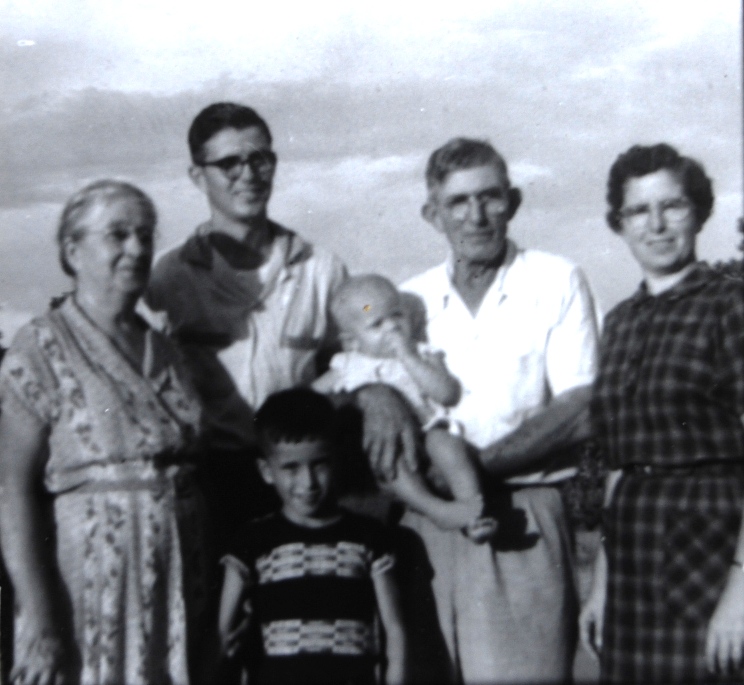

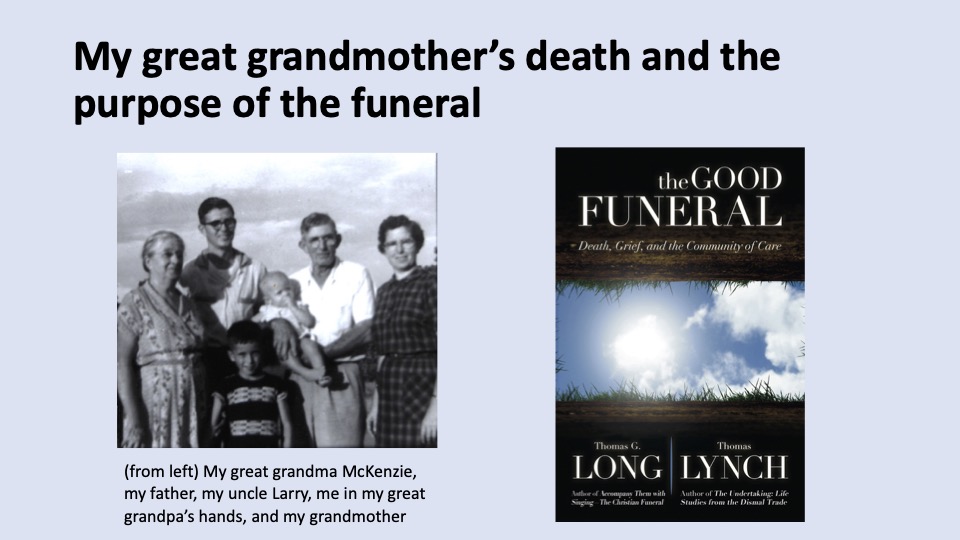
A lovely sharing, Jeff. I especially like the photo of your family, which I’m sure you shared before.
Most of several generations on my mother’s family are buried in a graveyard in Smith’s Cove. I always go by and visit everyone, including my parents. My siblings and their spouses all have plots reserved together in a new extension of the graveyard. As for me, I joke that I want bits of my ashes scattered on all of the continents. Terry and I really haven’t decided where we want our ashes to go. Our best friends were in town this week, and one of their plans was to visit a garden that might become a place for their ashes. I guess I’m procrastinating and should get more serious.
Our family funerals have become a celebration of life. Those who can go to an immediate funeral wherever the family member has died. Usually we schedule the celebration of life months in the future, so we can all come together in Smith’s Cove in the summer. We have another service and then a wonderful party to celebrate the person who has died ~ always poignant, full of tears ,and laughter.
Thanks for sharing your memories, my friend!
Those Smith Cove gatherings sound wonderful! I think a “good funeral” does three things: 1 we give thanks for and celebrate the life of the deceased. 2. We surround the grieving with our presence and love. and 3. We are reminded of the hope we have in everlasting life in Jesus Christ.
Absolutely!
Deaths, while sad in the moment, are important markers in the history of a family. I am at an age where many of my family worries revolve around preparing for the next stages in my aging parents’ lives. It begins with adjusting to their increasing needs, of course. Eventually, it will mean adjusting to their partings from us. It will change my own life in so many ways I’ve never really thought about before. Apart from missing them, it will inevitably change my relationship with my sister, for instance.
Your thoughts here raise the question of how to preserve the memories, not just for myself but for future generations. Neither of my parents wants to be buried or have any sort of marker anywhere. For me, that’s okay. I will always have the memories of my time with them. I don’t need a marker. But what about for others? How do we carry on the story of our family in a way that could eventually be meaningful to someone else.
It’s sad to think about, of course, but increasingly important to do so.
Thank you as always for sharing your own memories and wisdom.
I think you hit the nail on the head. It’s more important to remember and share the stories than a location of where the body ended up. We learn from the stories.
That was a beautiful memory, Jeff.
Thanks, Jacqui
I grew up next to the Loess Hills in Iowa. I like to joke that I lived in the suburbs, even though my hometown only had 1200 people in it. You could see corn fields out our picture window, compliments of Slimer’s farm. Next to the farm was the town cemetery. I spent countless hours there, sledding in the winter and riding my bike in the summer. For the longest time, I thought that the name of the site was simply Mapleton Cemetery. It was at my grandmother’s funeral when I discovered it also had another name, Mount Hope. There was one remarkable about feature about Mount Hope. The Catholic portion had a life-sized crucifix. Every time I return home, I make sure to climb up Mount Hope and visit the man on the cross.
Good memories. I like the name, Mt. Hope (it conveys our hope even in a flat Iowan landscape). I’m not familiar with the Loess Hills. I’ll have to look them up.
Funerals are sad but we owe it to our family members to honor them one last time and see they are put to rest.
The book I referenced discusses that need to deal with the body and how it helps us move on as we honor the person and give thanks for their lives.
I don’t think I’ve ever been to a real funeral. I have a small family, and nobody who has died wanted a funeral.
I always tell people who say they don’t want a funeral that it is not for them, but for those who are left behind. Sadly, I had attended two funerals for friends by the time I was 20.
I’m not a fan of funerals (or weddings, for that matter). The first I attended was my father’s when I was 11. It made its mark on me and I still only go to them when I feel totally obligated. I’ll admit that last two I attended were true celebrations of life which I enjoyed. My plans don’t include a funeral or even a marked location showing where my ashes are to be scattered. This frustrates my genealogy family members.
That must have been hard to attend a funeral for your father and that age. It is hard to do such funerals, and I try to say something special for young children when I officiate. I hope it helps, but am sure that it’s a drop in the bucket to what they are experiencing.
I have always found great comfort at funerals. I’m not sure why that is especially when my parents were completely the opposite. But I have good memories of all the funerals I have attended.
I would agree that there is comfort at funerals–I don’t mind officiating at them.
Lots of wonderful wisdom in this update, Jeff. Also appreciate hearing about you, your memories and your family. It is the one thing that I know so little about because my mom remarried and not a lot of history was passed down.
I was blessed to be born into a family with all four grandparents and five great grandparents. But sadly, it meant that I had a lot of funerals growing up because before I finished my second year of college, I was down to one great grandmother and one grandmother. But it was amazing that I was 59 when I lost my grandmother (the daughter of this great grandmother).